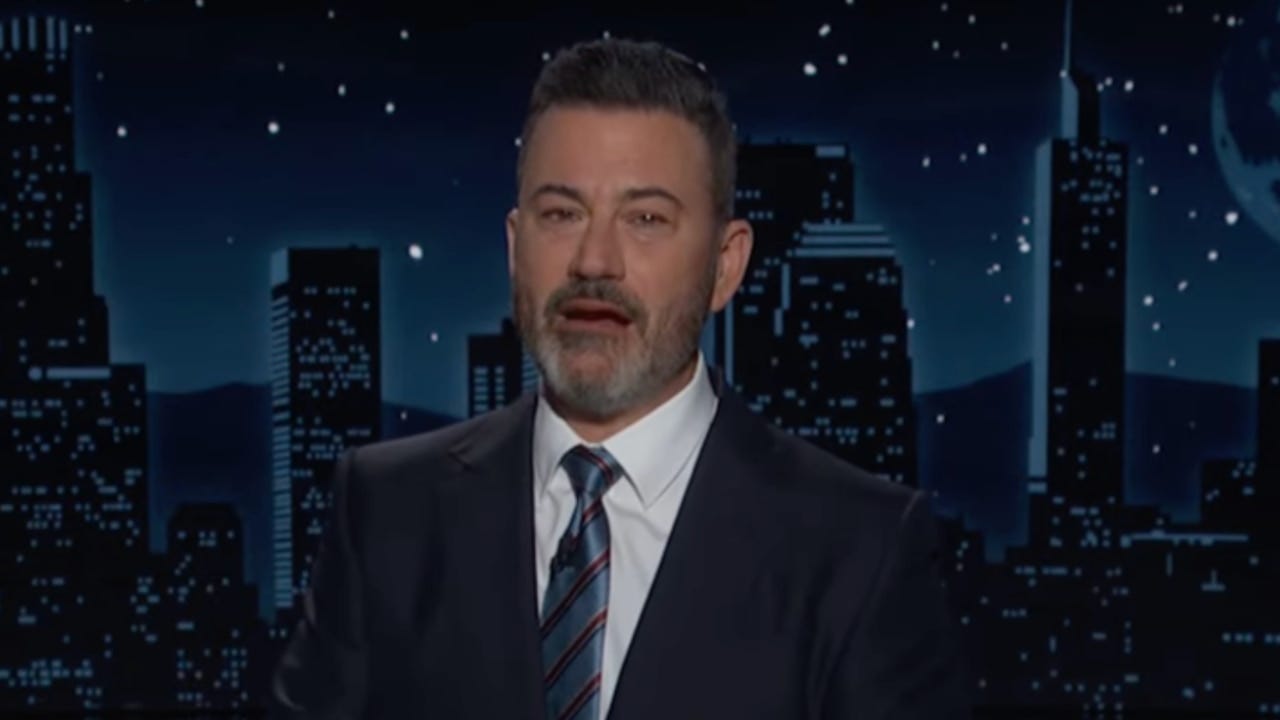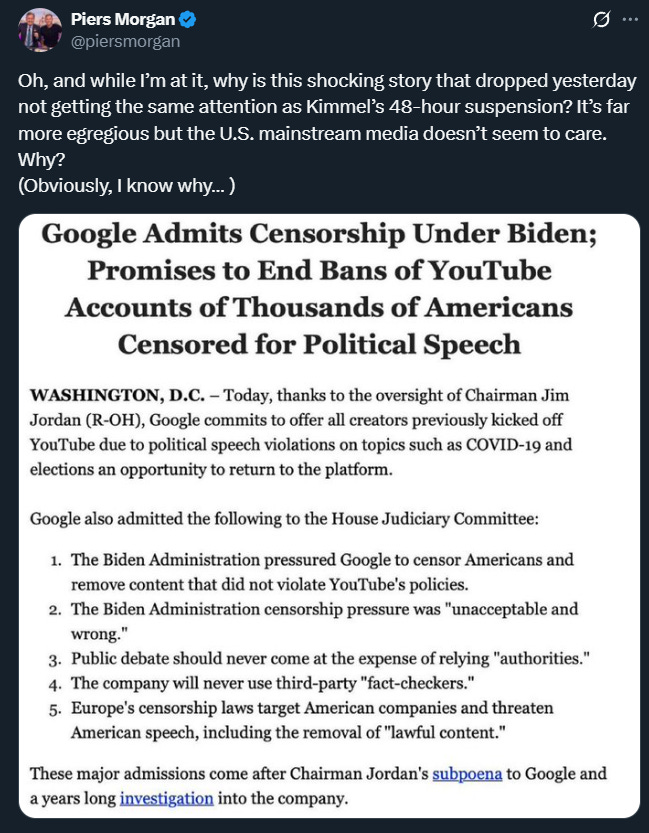Jimmy Kimmel Ignites Debate on Government Censorship, So Let’s Talk About YouTube Censorship at the Request of the Biden Administration.
The recent suspension of Jimmy Kimmel from ABC has sparked a heated debate about government overreach and free speech, drawing attention from celebrities and political figures alike. However, while the Kimmel controversy dominates headlines, a quieter yet more alarming story has emerged: Google has admitted to censoring thousands of YouTube accounts at the behest of the Biden administration, particularly during the COVID-19 pandemic and the 2020 election cycle.
This revelation, detailed in a letter to House Judiciary Committee Chairman Jim Jordan on September 23, 2025, promises to reinstate banned creators but raises serious questions about the balance between government influence and platform autonomy. Let’s dive into this unfolding saga, exploring how Kimmel’s case contrasts with YouTube’s admissions and why mainstream media seems to be overlooking the latter.
Here’s the TLDR...
Jimmy Kimmel’s suspension by ABC has ignited a free speech debate, with stars like Jennifer Aniston and Meryl Streep calling it a “dark moment.”
Google admitted the Biden administration pressured YouTube to censor content, including lawful speech, on COVID-19 and elections.
YouTube promises to reinstate thousands of banned accounts, following a year-long investigation by Chairman Jim Jordan.
Mainstream media’s silence on this story contrasts with the Kimmel coverage, prompting questions about bias and priorities.
The Kimmel Suspension: A Flashpoint for Free Speech Concerns
On September 22, 2025, ABC suspended Jimmy Kimmel Live! indefinitely after the comedian’s remarks about the assassination of conservative activist Charlie Kirk drew ire from the Trump administration and the U.S. broadcast regulator. Over 400 celebrities, including Jennifer Aniston and Robert DeNiro, signed a letter decrying the move as a “dark moment for freedom of speech,” accusing ABC of caving to political pressure. The fallout has fueled a national conversation about censorship, with late-night hosts and critics arguing that government threats to broadcasting licenses infringe on First Amendment rights. Yet, this high-profile case may be overshadowing a more systemic issue of government influence on social media platforms.
YouTube’s Shocking Admission: Censorship Under Biden’s Watch
While Kimmel’s suspension grabs headlines, a bombshell dropped on September 23, 2025, when Google, YouTube’s parent company, confessed to yielding to Biden administration demands. In a letter to Chairman Jim Jordan (R-OH), Google admitted that senior officials pressured the platform to remove content—some of which did not violate YouTube’s policies—related to COVID-19 and the 2020 election. The company acknowledged four key points:
The Biden administration’s pressure led to the removal of non-violating content.
This censorship was “unacceptable and wrong.”
Public debate should not rely on “authorities” at the expense of open discourse.
YouTube will no longer use third-party fact-checkers, citing threats to American speech from such practices.
Additionally, Google highlighted concerns about European censorship laws impacting U.S. platforms, a nod to the broader global context. As a result of Jordan’s year-long investigation and subpoena, YouTube has pledged to reinstate thousands of accounts banned for political speech violations, a move hailed as a “big win for freedom” by the Judiciary Committee.
The Media’s Selective Silence
Piers Morgan, in his September 24, 2025, X post, questioned why this Google admission isn’t receiving the same attention as Kimmel’s 48-hour suspension. The discrepancy is stark: while Kimmel’s case dominates U.S. media, with outlets like BBC covering the celebrity backlash, the YouTube story has been largely ignored by mainstream networks except for Fox News and Newsmax.
Critics, including Morgan, suggest this silence reflects a bias toward narratives favoring government intervention, a claim echoed by users like @matt_vanswol, who noted the lack of conservative protests compared to the Kimmel outrage. This selective coverage raises questions about media priorities and the influence of political leanings on news cycles.
Fact-Checking the Claims
Google’s admission is verifiable through the Judiciary Committee’s public statements and the company’s letter, confirmed on September 23, 2025. The Biden administration has not directly refuted the pressure claims but has historically defended its actions as efforts to combat misinformation, as seen in White House press secretary Karine Jean-Pierre’s 2024 statements to AP News. Kimmel’s suspension is documented by ABC’s official announcement and BBC reporting, with no denial from the network. The reinstatement promise aligns with Jordan’s oversight timeline, adding credibility to the narrative.
What This Means for the Future
The juxtaposition of Kimmel’s suspension and YouTube’s confession highlights a double standard in how free speech violations are perceived. Kimmel’s case, tied to a single network and a Trump-era threat, garners widespread sympathy, while the Biden administration’s broader influence on multiple platforms receives less scrutiny. YouTube’s policy shift away from third-party fact-checkers and its reinstatement pledge could signal a pushback against government overreach, but it also underscores the need for transparency.
As debates intensify, users may wonder: Are we seeing the tip of the iceberg in government censorship? or Will media outlets finally address this systemic issue?
For now, the conversation around Kimmel serves as a gateway to a larger discussion about who controls the narrative—and at what cost.
Hat Tips
X Post by @piersmorgan, 09:57 2025-09-24 UTC: https://x.com/piersmorgan/status/1970789705642881191
BBC News, “Top stars call Jimmy Kimmel suspension ‘dark moment’ for free speech,” 2025-09-22: www.bbc.com
House Judiciary Committee Statement, 2025-09-23: @JudiciaryGOP
AP News, “Supreme Court sides with Biden administration in social media dispute,” 2024-06-26: apnews.com
Compiled and Edited by Ivy Adams for Pirates & Princesses.



